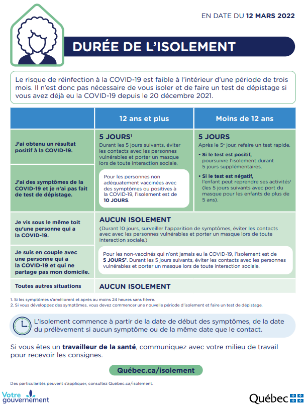COVID-19 Home kit
- What symptoms are consistent with COVID-19?
- What do I do if my child or I have symptoms consistent with COVID-19?
- What if the test results of the symptomatic person are negative?
- What do I do if my child or I test positive for COVID-19?
- What do I do if my child has come in contact with a case of COVID-19 at school or in daycare?
- What do I do if my child or I have been in contact with a case of COVID-19 at home?
- What do I do if another member of our household becomes symptomatic or tests positive?
- What is the isolation period?
- If someone has tested positive for COVID-19, when can they receive a COVID-19 vaccine?
What symptoms are consistent with COVID-19?
Click on the link to find out the symptoms consistent with COVID-19.
What do I do if my child or I have symptoms consistent with COVID-19?
- A person with symptoms should self-isolate immediately.
- The symptomatic person should test at home and follow isolation instructions based on the results.
- If you do not have access to a screening test or if the test is positive, the symptomatic person must follow the Instructions for people with COVID-19and everyone living in the same household must follow the Instructions for people identified as contacts of a case of COVID-19.
For instructions that apply to everyone’s situation, the government has posted a COVID-19 self-assessment tool, so you can find out the recommended steps to follow.
What do I do if the test results of the symptomatic person are negative?
This person needs to self-isolate, monitor their symptoms and take a second rapid test 24 hours later.
After the second rapid test:
- If the results are positive, continue isolation* following the Instructions for people with COVID-19 and all people living in the same household must follow the Instructions for people identified as contacts of a case of COVID-19.
- If the result is still negative and symptoms decrease, you can resume your activities while following the Basic Health Instructions.
- If the result is negative and the symptoms persist or worsen, call 1 877 644-4545 and you will be directed to the appropriate resource.
*Note that the first day of symptoms is day 0 (D0) and day 1 (D1) is the day after the onset of symptoms. For example, if symptoms started on Monday D0, Tuesday is D1, so isolation will be completed at the end of D5, which is Saturday night.
What do I do if my child or I test positive for COVID-19?
A person 12 years of age or older AND properly vaccinated must:
- Self-isolate for a minimum period of 5 days.
- Follow the Instructions for people with COVID-19; everyone living in the same household must follow the Instructions for people identified as contacts of a case of COVID-19.
A person 12 years of age and older AND not properly vaccinated must:
- Self-isolate for a minimum period of 10 days.
- Follow the Instructions for people with COVID-19; everyone living in the same household must follow the Instructions for people identified as contacts of a case of COVID-19.
Children under 12 must:
- Self-isolate for a minimum period of 5 days.
- Follow the Instructions for people with COVID-19; everyone living in the same household must follow the Instructions for people identified as contacts of a case of COVID-19.
What do I do if my child has been in contact with COVID-19 at school or in daycare?
Your child does not have to self-isolate.
For additional guidance, please refer to the Instructions for children (COVID-19).
What do I do if my child or I have been in contact with a case of COVID-19 at home?
A modified isolation must be applied: This means that neither you nor your child need to self-isolate, but for 10 days you must:
- Monitor for symptoms.
- Avoid contact with vulnerable people.
- Wear a mask during any social interaction, if the child is of elementary school age.
- Maintain a distance of 2 metres, wherever possible.
However, unvaccinated people who have never had COVID-19 must self-isolate for 5 days.
During the following 5 days, these individuals must:
- Monitor for symptoms.
- Avoid contact with vulnerable people.
- Wear a mask during any social interaction, if they are of elementary school age.
- Maintain a distance of 2 metres from others as much as possible.
For more information, refer to the Instructions for people identified as contacts of a case of COVID-19.
What do I do if someone else in our household becomes symptomatic or positive?
If someone else in the household develops symptoms or tests positive, they must begin a new period of isolation and follow the Instructions for people exhibiting symptoms of COVID-19.
There is no need to extend the isolation period for household contacts, if another member of the household develops symptoms or becomes positive for COVID-19.
What is the isolation period?
The risk of COVID-19 re-infection is low within a three-month period. Therefore, you do not need to self-isolate or test if you have already had COVID-19 since December 20, 2021.
For instructions that apply to you or your child,
refer to this tool:

For details that may apply,
visit Quebec.ca/isolation.
If someone has tested positive for COVID-19, when can they receive a COVID-19 vaccine?
In order to increase the effectiveness of the COVID-19 vaccine, it is recommended to wait 8 weeks before you or your child receive a dose of the vaccine.
However, there is no risk with receiving it before the recommended 8 weeks.
